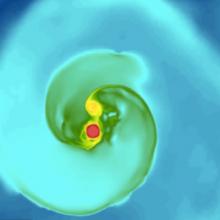
Description
Dr. Jason Nordhaus is awarded an NSF Astronomy and Astrophysics Postdoctoral Fellowship to carry out a program of research and education at the Center for Computational Relativity and Gravitation at the Rochester Institute of Technology (RIT). Nordhaus will conduct three-dimensional numerical simulations of common envelope (CE) phases with a new, state-of-the-art adaptive mesh refinement, radiation-hydrodynamic code CASTRO (Compressible Astrophysics). For the past two years, Dr. Nordhaus has been active in the development of, and initial science applications of CASTRO to core-collapse supernovae. Despite the importance of CE phases for cataclysmic variables, merging compact objects, the progenitors of Type Ia supernovae, and low-mass evolved stars, common envelope phases have never been properly simulated. With the advent of peta-scale, high-performance computing facilities such as the NSF-funded Blue Waters system, simulating CE phases with advanced multi-grid, multi-core techniques is now possible. CASTRO has demonstrated excellent scaling at the peta-scale level, thus making it one of only a few astrophysics codes able to efficiently employ peta-scale resources. By employing CASTRO to simulate common envelope phases for various binary types and mass-ratios, significant and long-lasting progress can be made for a range of astrophysical systems.
Dr. Nordhaus will also develop a new, astronomy and scientific reasoning class to be taught to students at RIT's National Technical Institute for the Deaf (NTID). Dr. Nordhaus is fluent in American Sign Language, and NTID currently does not offer any deaf astronomy classes. The course will be entitled "The Universe Through Our Eyes and Hands: An Introduction to Scientific Reasoning and Astronomy." The course will deviate from a traditional lecture to teach scientific reasoning through astronomy in an active, but non-verbal, environment. An end-of-semester project will have students break into groups of 3-4 with each group designing a one-hour lecture for deaf high school students which highlights a particular topic from "The Universe" course. Based on these end-of-course projects, Dr. Nordhaus will produce a one-week, multi-media teaching guide that high-school teachers of deaf students can use in their classrooms. Dr. Nordhaus will make the material freely available to teachers throughout the country via NTID's extensive free online course materials.